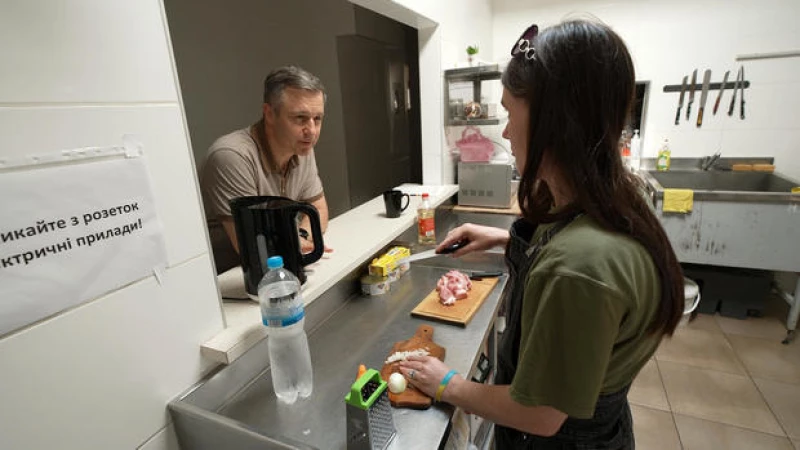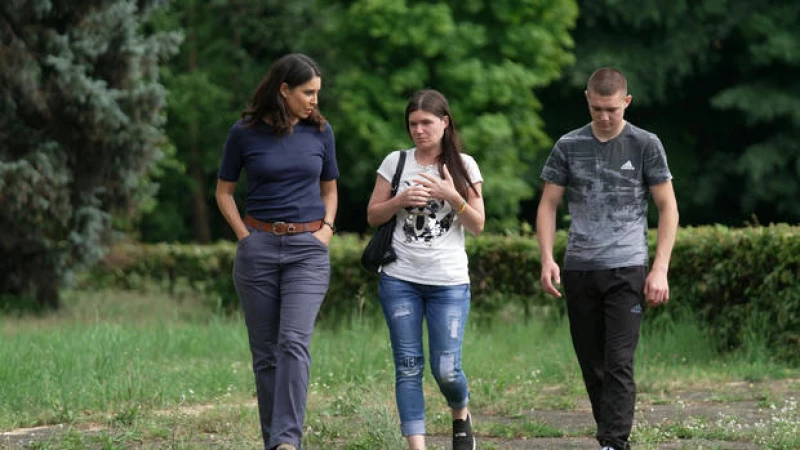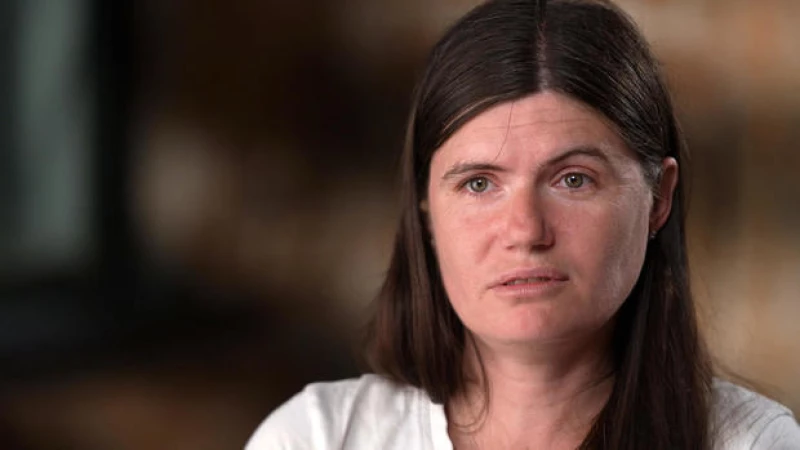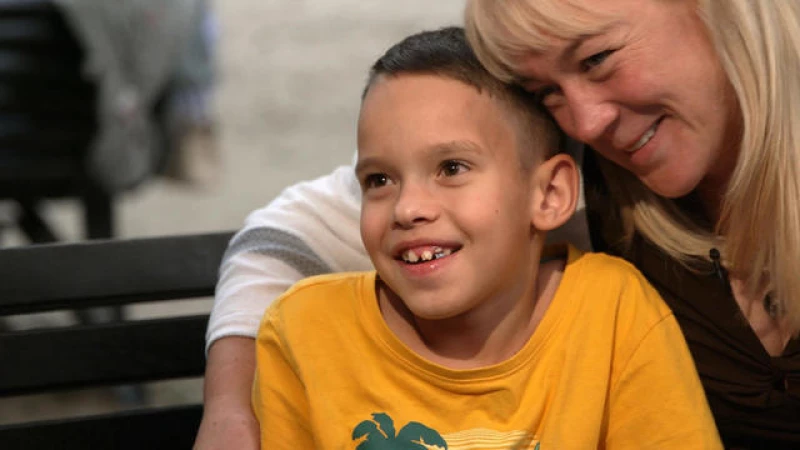Russian Abduction of Ukrainian Children
Ukrainian families are facing not only the constant violence of Russia's war but also the lesser known and more sinister danger of Russian abduction of their children. The exact numbers are difficult to determine amidst the chaos of war. While the Ukrainian government has officially documented over 19,000 children taken by Russia, they fear that the actual number could be as high as 300,000 children. The International Criminal Court has charged Russian President Vladimir Putin and his commissioner for children's rights with the war crimes of unlawful deportation and transfer of children. In an effort to shed light on this issue, we followed the story of one Ukrainian grandmother who embarked on an undercover mission deep into enemy territory to find her grandson before he vanished completely.
Polina, the grandmother, packed her belongings and embarked on a 20-hour train journey from Poland to Kyiv to meet with a nonprofit organization called "Save Ukraine". They had promised to assist her in locating her 9-year-old grandson, Nikita. Although she traveled light, the weight of a grandmother's worry was evident in her heart.
Polina (translated): He means everything to me – he is my air, my sky, my water. I live for him; he's my life. I love him very much.
Polina, a grandmother who wishes to remain anonymous, is currently in the process of seeking guardianship of her grandson. She left Ukraine in order to work and provide support for her grandson, who has special needs.
Polina (translated): He was taken by the Russian Federation. They kidnapped him.
Cecilia Vega: Did the Russians ask for permission to move Nikita? Did they inform anyone that they were taking him?
Polina (translated): No, they didn't inform anyone about anything. They simply took him and hid him.
Last October, Nikita was residing in a boarding school for disabled children when the Russian authorities ordered the transfer of all 86 children to a location deeper within Russian-controlled territory.
Polina (translated): I came home after work, opened Instagram, and saw a picture of my child - Nikita. The caption read, Russia is taking children.
Polina says the Russians engaged in a cruel game of hide and seek, relocating Nikita at least three times in eight months, including placing him in an orphanage in Russia.
Cecilia Vega: What was it like for you during those eight months?
Polina (translated): It was really awful, really awful. I couldn't sleep at night. I didn't want to go to work, I didn't even want to live because I had no one to live for. And then I discovered this website, Save Ukraine, on Facebook. So, I called them.
The phones at the Save Ukraine headquarters in Kyiv never seem to stop ringing.
More than 200 children, ranging from kindergarteners to teenagers, have been rescued so far.
At one of Save Ukraine's shelters for reunited families, we had the opportunity to meet the founder, Mykola Kuleba.
Cecilia Vega: How long do the families stay here?
Mykola Kuleba: They can stay for up to three months.
Kuleba, who served as Ukraine's presidential commissioner for children's rights for almost eight years, now leads these secret rescue missions. These missions rely on an underground network of safe houses and volunteers, including Russians who oppose the war.
Mykola Kuleba: I cannot disclose the number of organizations involved and volunteers.
Cecilia Vega: Are there dozens?
Mykola Kuleba: Maybe hundreds.
Cecilia Vega: Hundreds. Is there one piece of advice that every mother must know before she starts this journey?
Mykola Kuleba: We explain to them that Russians will intimidate them. They will do everything to stop them, to provoke them. That's why they should focus on their child. Their goal is to take their child and not be afraid.
However, it is hard for these women not to be afraid. They have to travel alone while the men stay behind to fight. Just before the mothers leave, they receive a safety briefing where they learn how to create cover stories for when they are inevitably interrogated by Russian forces.
According to Mykola Kuleba, Russia's goal is to erase the past of Ukrainian children and steal their future. Kuleba states that the children are brainwashed, indoctrinated, and Russified in special classes that teach them about the Russian empire and discourage any positive thoughts about Ukraine. Kuleba believes that every child who has been taken by Russia is a witness to war crimes.
Vlad Rudenko, who was taken at the age of 16, recounts how armed men arrived at his door and forced him to pack his things without allowing him to contact his mother. He was then taken on a bus to a camp in Russian-controlled Crimea along with a convoy of other children. Moscow claims that they are evacuating children from the conflict in Ukraine, but Kuleba argues that the children pose no risk to Russia and their removal is part of an attempt to destroy Ukrainian identity.

According to reports, Russia has been pressuring poor Ukrainian parents to send their children to schools and camps where they spend time with Russian children. The aim of this propaganda is to show the world images of happy kids. However, Ukrainian children have come forward to reveal that these camps are less about recreation and more about indoctrination. They are being told lies repeatedly, such as "Ukraine lost the war" and "their parents don't want them."
One child named Vlad secretly sent a video to his mother, revealing that speaking Ukrainian, talking about Ukraine, or even wearing Ukraine's colors was forbidden in the camp. Every morning, the Ukrainian children were forced to sing the Russian national anthem, but Vlad refused to comply. One night, he decided to take down the Russian flag.
When asked about the consequences, Vlad shared his experience: "They came over and told me to pack up. They said we're going to the detention ward. So, we went to the ward and I said, I'm not staying here, I'll break everything in here. They told me, we'll call a psychiatric hospital for you then. But in the end, they locked me up anyway in the detention ward for five days."
Tetiana, another child, was asked for her thoughts on Vlad's story.
Tetiana Bodak (translated): The words escape me as there are many things he kept from me. I am afraid of discovering something that I am better off not knowing.
When Tetiana rescued Vlad with the assistance of Save Ukraine, she had already lost eight months with her son.
Cecilia Vega: Did he appear different to you?

Tetiana Bodak (translated): Yes. I remember him leaving as a child, but when I saw him again, he had the eyes of a man with a mature perspective on life.
Polina couldn't afford to waste any more time with Nikita. The night before she left, she prepared gifts for her grandson.
This bus station was the furthest point our cameras could reach... but after nine days, she managed to call while we were with the Save Ukraine team. A translator conveyed her harrowing journey.
Translator: I traveled there by car through that minefield. The stench of death was heavy in the air.
What Polina couldn't reveal to us over the phone was that she and Save Ukraine devised a plan to bypass a border checkpoint near the school in occupied territory where Nikita was held: she posed as an aid worker. Her driver recorded as she entered the building.
Polina (translated): The director asked me, how did you get here? I told him, I'm a volunteer. I came here from Poland and brought you some humanitarian aid. I needed to say something, to be able to see Nikita and figure out a way to get him out of there. This was the only way to do it.
And then she finally identified herself as Nikita's grandmother and gave the school director a Ukrainian document authorizing her to take Nikita home. He refused.
Polina (translated): The director said to me, he's mine. I am his guardian. And I said, but I am his grandmother. You have no right because he has a biological grandmother who will take him back. This is my child.
Last year, Vladimir Putin changed the law to make it easier for some Ukrainian children to receive Russian citizenship, allowing them to be adopted by Russian families. And Putin's top deputy in charge of children's rights – Maria lvova-Belova – posted these videos of what she described as Ukrainian orphans with their adoptive parents.
lvova-Helova-- herself says she adopted a 15-year-old Ukrainian boy from the occupied city of Mariupol.
Polina showed us the documents that led her to believe Nikita was also about to be adopted.
Cecilia Vega: So, this is the Ukrainian birth certificate: born in Ukraine, Ukrainian child. And this is what Russia made – what does this say?
Polina (translated): It says that he is a citizen of the Russian Federation.
Cecilia Vega: It's almost hard for me to get my head around this. Your grandson is a Ukrainian citizen, and you're telling me, you believe the Russians were on the verge of giving him to a Russian family, of adopting him out to another family.
Polina: Yes, yes.
She says the school called her Ukrainian documentation fake and demanded a DNA test. They kept Polina waiting for the results.
For 70 days, she refused to back down…
Until finally, Polina was led into a room where she heard this:
Nikita (in reunion video): "Babushka!"
There to personally oversee the reunion- Maria lvova-Belova. Russian cameras recorded as the accused war criminal handed Nikita gifts.

She also made them an offer:
Polina (translated): Lvova-Belova said to me, would you like to stay with us in the Russian Federation maybe? We will give you some money. We will give you a car.
Cecilia Vega: They tried to get you to stay with Nikita?
Polina (translated): Yes, yes. I said: I don't need anything. I have everything.
Maria lvova-Belova insists Russia does not put Ukrainian children up for adoption and that it makes every effort to return them. On social media, she called Polina and Nikita's reunion a joy and wished them a quote "happy life."
Finally reunited-- Polina and Nikita began the long trip back to safety, driving day and night for a week.
We were with the Save Ukraine team when they arrived in Poland.
They have decided to reside in this location until the war comes to an end.
Cecilia Vega: What are your plans for your grandmother now?
Nikita informed me that he wants to engage in playing with toys with her.
With a beaming smile, he proudly declared: "This is my mother, my grandmother."







